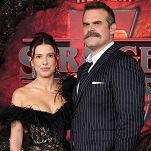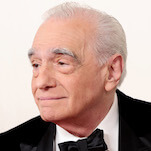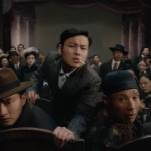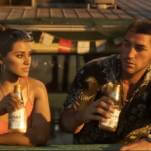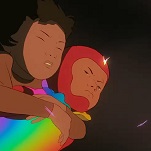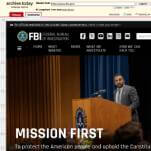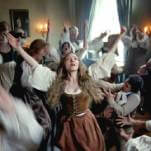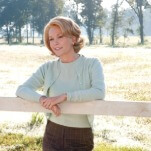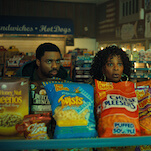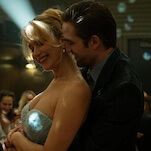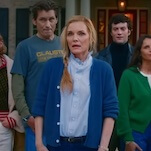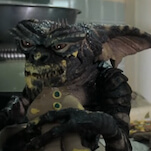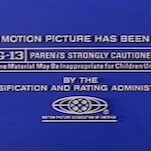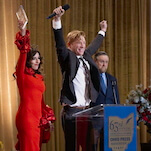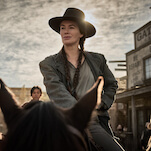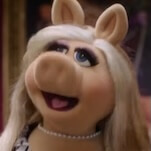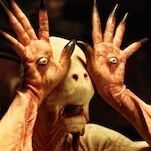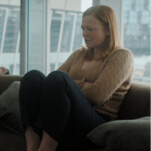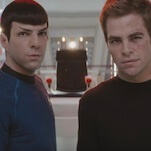“Lisa’s Rival” (season six, episode two; original airdate 9/11/94)
In which Lisa learns to be a bit, as the French say, «Bartesque.»
Lisa has always served as the audience surrogate in The Simpsons: a normal, reasonable voice in an increasingly insane situation—almost to a fault. The writers of the show tend to make a precocious 8-year-old girl do logical heavy lifting, requiring her to have expertise and maturity beyond her years because, well, someone in this universe needs to have it.
It’s unfair to Lisa, though, because she rarely gets to be a little girl. Some of the sweetest moments on the show have been when Lisa’s done just that, like at the end of “Lisa The Skeptic” in season nine, as she and Marge share a moment after the faux apocalypse. Those instances humanize Lisa; she’s not just a prodigy who quotes Pablo Neruda—she’s a child, beholden to the rules of childhood, at least occasionally.
A lot of elements make “Lisa’s Rival” a great episode—and make no mistake, it’s a classic—but the concept of a younger, smarter Lisa is an inspired choice. Credit Conan O’Brien, who originally suggested the idea when he was a staff writer. Lisa is a unicorn in the Simpsons universe, so it’s interesting that instead of making Lisa bend to the world around her, the world instead throws out another unicorn. Turns out there’s more than one in Springfield—she even has a picture of “Bleeding Gums” Murphy on her wall!—and that should be great news for lonely Lisa, who’s always trying to find a friend. Instead it makes her experience a new feeling: jealousy. On the commentary track, Yeardley Smith notes that “Lisa’s Rival” was the first time she really felt Lisa’s pain. “I was a bit worried about her,” she says.
Another excellent part of the episode comes from the character of Lisa’s rival, Allison (voiced by Winona Ryder). On the commentary track, the Simpsons crew notes that it was important not to make Allison a villain. That’d make it too easy for the audience and too simple for a show like The Simpsons, which has expertly explored the complex nature of relationships. As Lisa repeatedly tells herself to staunch her seething jealousy, Allison is a wonderful person—friendly, self-effacing, gracious, and, later, forgiving. Her innate goodness only makes the whole situation far more frustrating for Lisa, but also makes her predicament more realistic. The people who upset us are seldom simply bad apples.
Nor are the good simply good. Over the years, The Simpsons has explored the Bart-Lisa relationship to the point of pumping the well dry, but 1994 was still early enough that seeing how much Bart there is in Lisa (and how much Lisa there is in Bart) qualified as novel. The idea really took root in season three’s “Separate Vocations,” but we see it again here when Lisa’s desperation drives her down to Bart’s level. Writer Mike Scully, penning his first of many Simpsons episodes, twists that bit a slightly too, by making Bart’s original scheme hilariously non-diabolical: He suggests hosing Allison down, leaving him and Lisa “relatively dry.” (“Well, there’s bound to be some splash-back.”)
That’s one of the many great lines in “Lisa’s Rival.” I’ve found that, over the years, I still remember specific jokes perfectly—if endlessly quoting The Simpsons were a sport, I’d be the equivalent of an Ironman champion—but forget which specific episodes housed them. “Lisa’s Rival” offers a bounty of classic Simpsons jokes, from the all-time great Ralph line “I bent my wookiee” to Lisa’s failed “Jeremy’s Iron” anagram, to Lisa’s “Why would they come just to boo us?”
As Todd mentioned back in “Secrets Of A Successful Marriage,” The Simpsons around this time was starting to take heat for abandoning the smaller scale, realistic situations of its early episodes (though that realism is overstated) for an emphasis on jokes. The focus became getting laughs, not portraying the struggles of an average American family. With the story of Lisa feeling jealous of a girl at school, “Lisa’s Rival” brings the scope back down to those supposedly more grounded early episodes—then goes completely bonkers with its B-story.
George Meyer had the idea of Homer finding a bunch of sugar and embarking on one of his early side careers as a door-to-door sugar salesman—“one of the oddest B-stories in the history of B-stories,” remarks episode director Mark Kirkland on the commentary track. Not only did Meyer have the idea, but he came up with many of the jokes—including Homer’s diatribe about ruffling the feathers of blue bloods—off the top of his head. “That’s the way George walks around thinking,” Kirkland says.
Meyer is a legendary Simpsons figure, one of the original writers of the show and one of the primary architects of its voice. (John Ortved’s tremendously flawed Simpsons oral history did succeed at least in making a case for Meyer as a critical influence on the show.) Meyer was around when the writers composed those early, ostensibly more realistic episodes, yet he was the guy who had the ludicrous idea for Homer to sell sugar. The dichotomy of the mundane and outrageous is hard-wired into The Simpsons’ DNA; Meyer is practically the personification of it.
The sugar story is the outrageous yang to Lisa’s relatable yin, and both are hilarious. Few shows since have pulled off the balance so well (maybe just The Office?), and no other sustained it for as long as The Simpsons.
Stray observations:
- Like “Bart Of Darkness,” the Northridge Earthquake delayed production on “Lisa’s Rival,” which Kirkland was directing when the quake hit in January of 1994. The commentary track for this episode probably spends half its time talking about the quake.
- I miss the slightly more cognizant Ralph. “Lisa’s Rival” may be the first episode that made him a straight-up imbecile, but it has a lot of great Ralph quotes: “What’s a diorama?” “My cat’s breath smells like cat food.” “I bent my wookiee!” The crew notes on the commentary track that’s the most quoted Ralph line of all time.
- Professor Taylor reacts to Lisa’s “Jeremy’s Iron” whiff: “Well that’s…very good for a first try. You know what? I have a ball. Perhaps you’d like to bounce it.”
- Homer’s Scarface riff—“In America, first you get the sugar, then you get the power, then you get the women”—was my answering-machine message for a good chunk of my junior year of college.
- Up next: Erik revisits “Another Simpsons Clip Show.” If memory serves, it’s a clip show.

